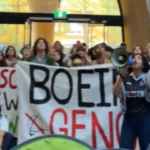The Modern Slave Trade is Alive and Well

A CNN report about West African migrants being sold in open-air slave markets in Libya sparked outrage around the globe last month. Although, reports about the growing slave trade in the North African country have been emerging since early 2017.
Published on November 14, the CNN report gained widespread attention as it contained footage of men being sold in a clandestine market. The migrants, who were offered up to buyers by the auctioneer as “big strong boys for farm work,” sold for 1,200 Libyan dinars, around AUD$1,130.
The grainy mobile phone footage was given to the news outlet by a contact. CNN followed up on the allegations by sending a group of reporters to Tripoli. They travelled to the outskirts of the city and captured footage of more men allegedly being sold in a residential backyard in the dead of night.
Held hostage for ransom
The International Organisation for Migration (IOM) revealed in April that it had documented incidents of the slave trade in Libya. Those caught up in the trade are migrants making their way to Europe to escape extreme poverty from countries like Niger, Ghana, Gambia and Nigeria.
A Senegalese survivor of the trade told IOM staff that he’d been taken to a slave marketplace after people smugglers driving him across the desert in Niger decided not to continue the journey onto the Libyan coast, as they hadn’t been paid by middlemen.
The 34-year-old man was sold to a Libyan, who took him to a home where 100 other migrants were being held hostage. The captives were beaten and forced to call relatives to ask for money for their release.
As the ransom was not forthcoming, the man from Senegal was then sold on to a larger holding house, where the price for his release grew higher.
A humanitarian emergency
Over the last three years, an estimated 450,000 migrants and asylum seekers have made their way from Libya across the Mediterranean Sea into Europe. And around 5,000 have died trying to cross the body of water.
The Libyan coastguard has been preventing the passage of the migrants with the aid of Italy and the EU. This has led to between 400,000 and 1 million returned migrants being detained in detention centres in Libya. Reports reveal that cases of robbery, rape and murder are rife within these centres.
And as the coastguard stems the flow of people across the sea, it seems traffickers are now turning to the local slave trade to make money from their human cargo.
Military intervention
In 2008, Italy agreed to pay then-autocratic ruler of Libya Muammar al-Gaddafi $5 billion in reparations over a five year period for their colonisation of Libya. In return, Gaddafi vowed to stop migrants from making the journey across the Mediterranean from the Libyan coastline.
However, in February 2011, the initially nonviolent Arab Spring uprising was set upon by government forces. And this sparked a catastrophic civil war, which ultimately led the US and its NATO allies to intervene in support of the rebels.
By October, Gaddafi had been overthrown and was killed by opposition fighters. And the western bombing campaign of Libya had left the country divided and in ruins.
Today, Libya is being run by three opposing factions. An internationally-backed government in Tripoli that holds little control. A conservative Islamic government that’s also based in the capital. And in the east, an anti-Islamic government holds sway.
The lawlessness and division in this vast and sparsely populated country has led it to become the favoured route for migrants and people smugglers making their way to the Mediterranean Sea from West Africa.
Elsewhere in Africa
However, Libya isn’t the only African nation where slavery is taking place. An estimated 10 to 20 percent of the population in Mauritania are enslaved. The centuries old practice continues despite it being outlawed in 1981. The nation was the last country in the world to ban slavery.
The Sudanese civil war, which raged between 1983 to 2005, led to a resurgence of slavery in that country. And despite the war coming to an end over a decade ago, there are pockets of Sudan where the practice is still being carried out.
Last year, the Global Slavery Index estimated that 250,000 people are held in a modern form of slavery in South Africa. This includes forced labour, human trafficking and debt bondage. During the time of the transatlantic slave trade, the nation of South Africa was plundered by Europeans.
The impact of the west
At least 10 million Africans were transported to Europe and the Americas over the three and a half centuries of the transatlantic slave trade. The practice was outlawed over a thirty year period, ending with the Portuguese ban in 1836. But, it continued on illegally well into the 19th century.
European slave trading and the western colonisation of the African continent left a devastating legacy of poverty and deprivation that carries on today. And this, along with the ravages of climate change in sub-Saharan Africa, has led to the growing diaspora from West Africa.
This week, Amnesty International accused European nations of complicity in the human rights abuses currently being perpetrated upon West African immigrants in Libya.
The organisation said in a press release that “European governments are actively supporting a sophisticated system of abuse and exploitation of refugees and migrants by the Libyan coast guard, detention authorities and smugglers in order to prevent people from crossing the Mediterranean.”
Moves to stamp out the trade
In light of the CNN report, Libyan authorities have launched a formal investigation into the slave auctions.
Libyan ambassador Elmahdi Elmajerbi told the UN Security Council that the government was investigating the footage, but questioned its authenticity. He said Libya was being subjected to “a large-scale false media campaign of defamation” trying to portray the country as racist.
In a statement, the chair of the African Union Commission Moussa Faki Mahamat condemned the auctions of African migrants “as despicable acts.” He said the union would be sending an envoy to Libya in order to work with authorities “to address the plight of the African migrants.”
The African Union will “spare no effort to help bring these acts to an end and ensure the respect of the most basic human rights,” Mr Mahamat declared.








